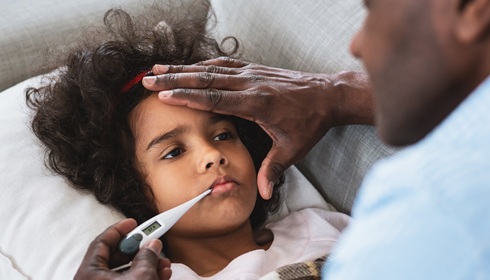A Parent’s Guide to Understanding Symptoms
When sniffles and coughs start making the rounds at home, it’s natural to wonder: Is this just a cold, or something more serious like the flu or COVID-19? During the colder months, it can be tough to tell the difference, especially since these illnesses often share similar symptoms.
The Usual Suspects: Cold, Flu, and COVID
If your child (or you!) comes down with a runny nose, cough, sore throat, or fever, chances are it could be any one of the three. Most of the time, these symptoms are mild and go away on their own. But in some cases—especially if someone in your home has a higher risk of complications—it's important to figure out what you're dealing with.
That’s because illnesses like the flu and COVID-19 can lead to more serious health issues, particularly for young children, older adults, and people with certain medical conditions.
Why It’s Hard to Tell the Difference
Unfortunately, a lot of the symptoms overlap. A headache and a cough could point to a cold, the flu, or even COVID. That’s why doctors often recommend getting tested (or “swabbed”) if someone in your home is sick, especially if they’re in a group that’s more vulnerable.
Who Is Most at Risk for Complications?
The Centers for Disease Control and Prevention (CDC) has shared a list of people who are more likely to get seriously sick from the flu. If your child or a loved one falls into any of these categories, you may want to talk to your doctor sooner rather than later:
- Babies under 2 years old, especially infants under 6 months
- Adults over 65
- People with asthma or lung conditions, like COPD or cystic fibrosis
- Anyone with diabetes, heart disease, or kidney/liver problems
- Those with weakened immune systems (including those on cancer treatments or with conditions like HIV)
- People who are very overweight (a BMI of 40 or higher)
- Children and teens who take long-term aspirin-containing medicine
- Pregnant people or those who’ve recently given birth
- People who live in nursing homes or long-term care facilities
- Individuals with certain disabilities, especially if it affects breathing or swallowing
Some communities, including non-Hispanic Black, Hispanic or Latino, and American Indian or Alaska Native groups, have also been shown to have a higher risk of being hospitalized with the flu.
What Should Parents Do?
If your child gets sick and you're unsure what it is, watch how the symptoms progress. You don’t need to panic, but if your child has a high fever, trouble breathing, or just seems “off” in a way that concerns you, call your doctor. And if you or anyone in your home is in a higher-risk category, getting tested for flu or COVID-19 is a good step.
Our clinics are open late nights, weekends, and holidays for your child’s urgent care needs. Click here to find a location near you and book your visit today.
Resources:
- “How to tell cold and flu symptoms apart.” MSU Health Care Pharmacy.
- “People at Increased Risk for Flu Complications.” Centers for Disease Control and Prevention (CDC), 11 Sept. 2024.
- “Parents: Help Children Fight Flu.” Centers for Disease Control and Prevention (CDC), 17 Sept. 2024.


